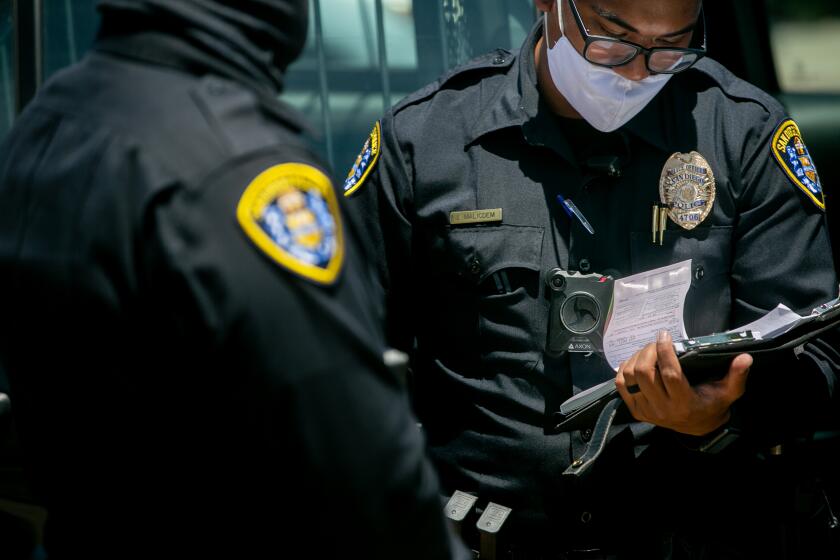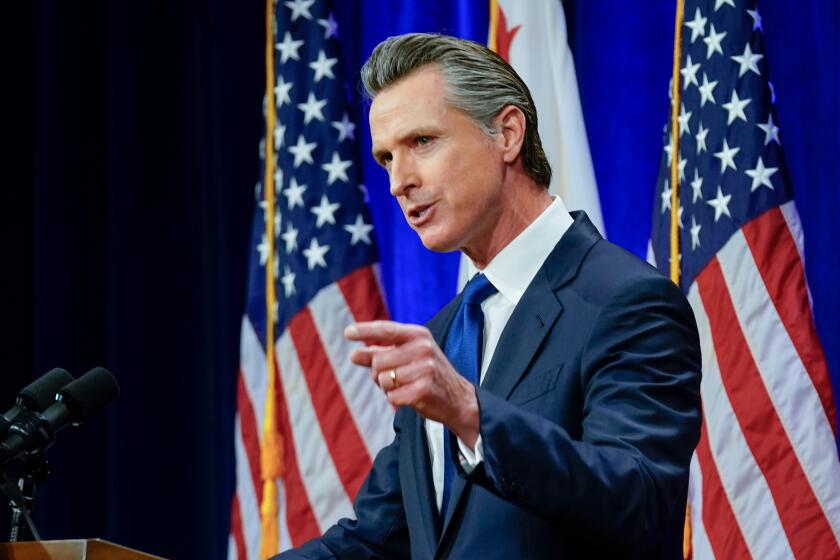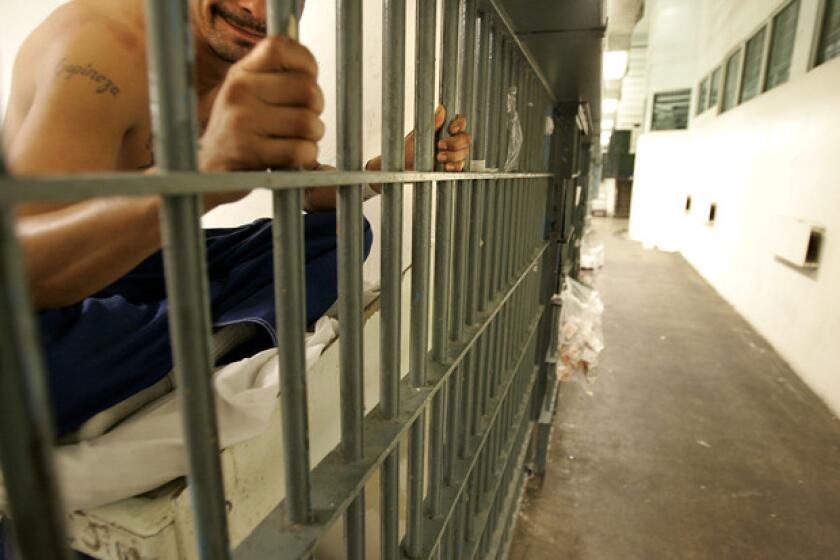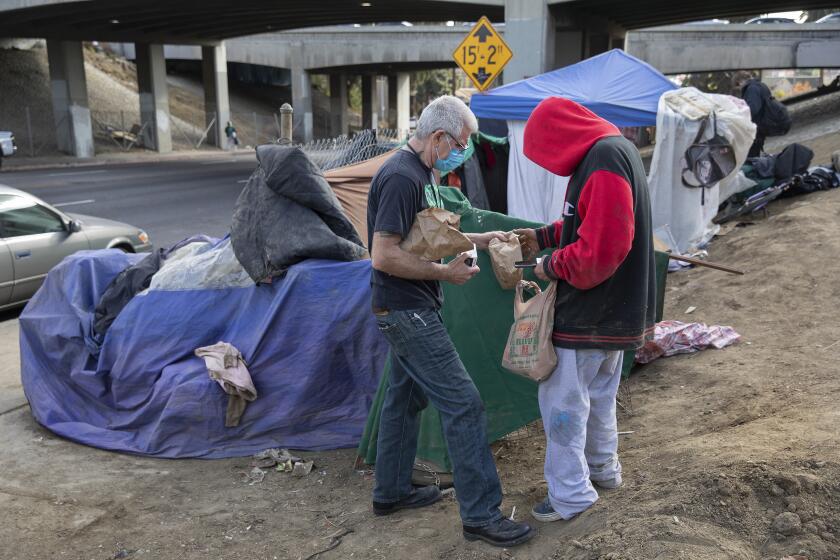Op-Ed: Miss a traffic ticket deadline, add $300. Guess who this affects the most

Here’s something you might find surprising. Despite two years of pandemic-related anxieties, California is now so awash in money that politicians in Sacramento are debating how to spend tens of billions of surplus dollars.
It’s an unlikely season of plenty, and it leaves us with no excuse for ignoring the dirty secrets that help fill California’s coffers in leaner times — a crazy array of fines, fees and penalties levied on traffic violations, foster care and government benefits — that squeeze money from those least able to afford it.
These are “high-pain, low-gain” ways of raising money. They glean a few extra dollars for community chests but at tremendous future cost. We don’t save taxpayer dollars by crushing families’ finances. We won’t move toward a more equitable world with predatory practices that disproportionately hit Black and brown Californians.
Next month Gov. Gavin Newsom has an opportunity to rein in the worst of these schemes when he puts out his updated budget, known as the May revise. The governor and legislators have proposals in hand for the following reforms, which should be embraced in the 2022-23 fiscal year.
Stop shaking down low-income Californians when they get a traffic ticket. The “civil assessment” fee is classic overreach. It’s an extra $300 fee if you miss a traffic court date or the deadline for paying traffic ticket fines — already among the most expensive in the country.
California adds fees onto traffic citations that have nothing to do with the violation, making our tickets among the most expensive in the nation.
There’s no evidence these punitive fees spur people to pay up or show up. A survey from Debt Free Justice California showed that 73% of those charged the fee had no idea they might be so penalized. So it’s hardly an incentive. The same survey showed that 68% could not afford to pay up, with 86% saying it would make it harder to buy food that month.
The state gains are minimal to boot. The collection rate on civil assessments is estimated to be 20% in Riverside County, for example, and 8% in Humboldt County. Meanwhile research shows that simply sending text message reminders is a more effective way to get people to show up to court.
The governor has proposed cutting this fee in half. But California should get rid of it altogether.
Stop foisting the cost of safety net services onto the poorest families. Times columnist George Skelton opened a recent column this way: “This seems counterintuitive in such a liberal state, but it’s a fact: California rips off child support payments intended for moms that receive government aid.”
Indeed, if a single parent requests safety net services — Medi-Cal or CalWORKs — for themselves and their child, the state requires the other parent to pay for these services by taking it out of child support. The result? About 40% of child support payments — the bulk of which are owed to children in poverty — never make it to children. In 2020, this money grab siphoned off $430 million from poor parents.
It’s largely Washington’s fault because of a federal law enacted nearly a half-century ago, columnist George Skelton writes.
Other states — including Colorado — have done away with this counterproductive policy. When San Francisco experimented with a similar pilot program, parents actually paid more child support more readily because they knew their money would go to their kids. The governor has proposed getting rid of this requirement for some parents on public assistance — those who have formerly received it. But all families that qualify for aid should see their child support go where it’s needed most, to their children.
Don’t make grandmothers pay to talk to their incarcerated grandsons. This is the ultimate penny wise, pound foolish folly. We gouge families of incarcerated people for phone and video calls.
A teenager can gab on FaceTime for 15 minutes for next to nothing, but a 15-minute video call in California prisons costs $3. This generates revenue for jails, prisons and youth lockups but at too high a price: preventing the incarcerated from staying in touch with their families, their lifelines of support. Research shows the costs of calls are most often borne by loved ones — typically women of color with low incomes.
State Sen. Josh Becker (D-San Mateo) has introduced the Keep Families Connected bill (SB 1008) to make all communication between incarcerated people and their loved ones free. It deserves everyone’s support.
County jail operations — including inmate education and reentry services — shouldn’t be funded by price-gouging fees for phone calls and commissary items.
Stop paying incarcerated people mere pennies for an hour’s work. State prisons pay incarcerated people anywhere from eight cents to $1 an hour for scrubbing floors, cooking meals and even fighting fires. Someone earning 8 cents an hour would need to work 37 hours to pay for a 15-minute video call with their kids.
State officials say these jobs are voluntary, but organizations like the Sister Warriors Freedom Coalition say this labor is forced, and a half-step away from slavery. The California Constitution currently allows “involuntary servitude” during incarceration. The Legislature should put a constitutional amendment in motion to end this punitive loophole.
If incarcerated people work, they should be paid enough to meet their basic needs. SB 1371, introduced by Sen. Steven Bradford (D-Gardena), would phase in fair pay at state facilities over five years.
Stop billing parents for their children’s time in foster care. Too often, the state requires payment for foster care from families that can ill afford it. Studies conducted in California, Minnesota and Washington all say the same thing: For every $3 the government spends to enforce foster care child support, it collects approximately $1. Along the way, families that need help are undermined, and their children’s time in foster care is extended.
Assemblymember Isaac Bryan (D-Los Angeles) introduced AB 1686 , which would reduce the number of families required to pay for foster care.
The $38.5-billion spending proposal is more than $2 billion larger than the 2021-22 proposal submitted a year after the pandemic began.
Budgets reflect values, and California’s proposals for how to use its surplus needs to be realigned with an emphasis on equity. Against the odds, the financial sun is shining in Sacramento. Let’s make sure California’s poorest feel its warmth.
Anne Stuhldreher directs the Financial Justice Project in the treasurer’s office of the city and county of San Francisco. She is a fellow in the Aspen Institute’s Financial Security Program.
More to Read
A cure for the common opinion
Get thought-provoking perspectives with our weekly newsletter.
You may occasionally receive promotional content from the Los Angeles Times.














